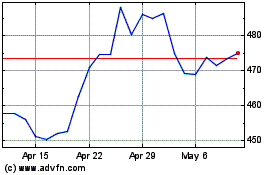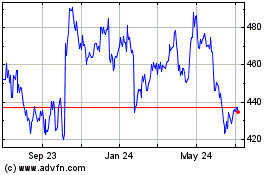Pentagon Warns About Defense Deals
September 30 2015 - 5:40PM
Dow Jones News
The Pentagon's chief weapons buyer issued a stark warning about
the potential impact of further consolidation among large defense
companies, which he said could hurt innovation, constrict the
supplier base and inflate costs.
Frank Kendall, the Defense Department's undersecretary for
acquisition, technology and logistics, said Wednesday that recent
mergers and acquisitions have prompted the Pentagon to consider
asking for national security concerns to be among the criteria when
such deals are reviewed by competition officials.
Mr. Kendall said he backed the Justice Department's approval
last week of plans by Lockheed Martin Corp. to buy the Sikorsky
Aircraft unit of United Technologies Corp. for $9 billion, but he
said such deals have given rise to policy concerns.
"With size comes power, and the department's experience with
large defense contractors is that they are not hesitant to use this
power for corporate advantage," Mr. Kendall told reporters. He said
his concerns weren't directed at any particular transactions.
He said the Pentagon planned to engage Congress on the
issue.
"If the trend to smaller and smaller numbers of weapon-system
prime contractors continues, one can foresee a future in which the
department has at most two or three very large suppliers for all
the major weapons systems that we acquire," Mr. Kendall said.
Competition experts said the Pentagon wanted to signal that
approving the Sikorsky deal didn't change Defense Department's
long-standing opposition to deals involving the biggest defense
companies.
"The message is that it's not open season," said Jeff Bialos, a
partner at law firm Sutherland Asbill & Brennan LLP, who has
worked on a number of defense deals.
Lockheed doesn't make helicopters but supplies weapons and
communications systems to Sikorsky and other manufacturers. The
company has said it would continue to supply the government with
equipment for other helicopters,
The proposed deal concentrates even more of the Pentagon's
largest hardware programs with its biggest supplier. The Defense
Department generated almost 60% of Lockheed's revenues last year,
with other U.S. agencies and export sales adding another 20% each.
Lockheed, which makes the F-35 jet fighter, is bidding in
partnership with Boeing Co. for another huge contract, a proposed
new bomber for the Air Force.
Defense stocks were unchanged after Mr. Kendall's statement,
though analysts have long discounted a deal involving any of the
five biggest defense companies: Lockheed, Boeing, Northrop Grumman
Corp. General Dynamics Corp. and Raytheon Co.
Defense Secretary Ash Carter earlier Wednesday repeated his
opposition to mergers between the prime contractors but declined to
comment on Lockheed's planned purchase of Sikorsky.
"It was important to avoid excessive consolidation in the
defense industry to the [extent] that we didn't have multiple
vendors that could compete on programs," he said during a Pentagon
press briefing.
The Pentagon's de facto ban on big deals has been in place since
1998 when antitrust officials blocked Lockheed's plan to buy
Northrop Grumman.
Write to Doug Cameron at doug.cameron@wsj.com
Subscribe to WSJ: http://online.wsj.com?mod=djnwires
(END) Dow Jones Newswires
September 30, 2015 17:25 ET (21:25 GMT)
Copyright (c) 2015 Dow Jones & Company, Inc.
Northrop Grumman (NYSE:NOC)
Historical Stock Chart
From Mar 2024 to Apr 2024

Northrop Grumman (NYSE:NOC)
Historical Stock Chart
From Apr 2023 to Apr 2024
